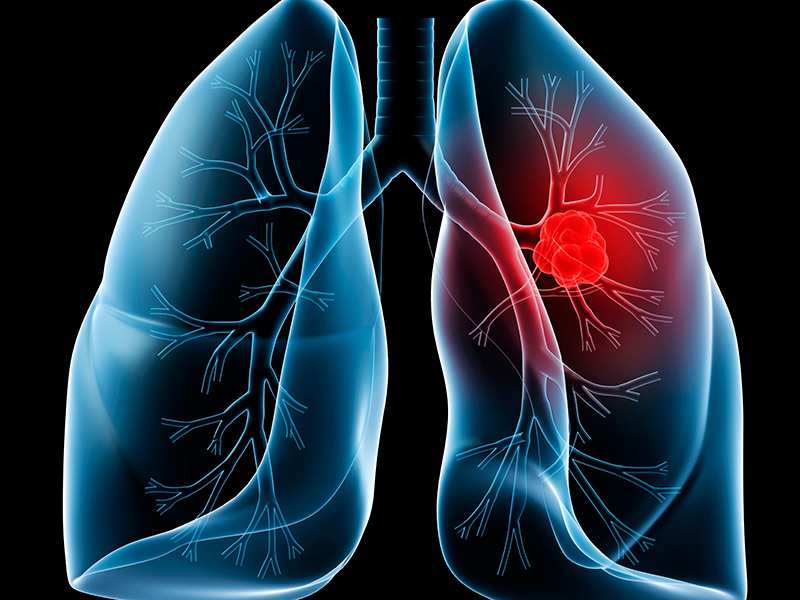Lung Cancer

OVERVIEW
Lung cancer is an abnormal growth of cells in the lungs. Lung cancer may eventually spread to other parts of the body if not discovered and treated early. The most common factors that can cause lung cancer are exposure to radon, asbestos, air pollution, certain chemicals in the workplace; smoking or passive smoking; or family history of lung cancer.
Type of Lung Cancer
- Non-small cell lung cancer (NSCLC).
- Small cell lung cancer.
Lung cancer is of two types:
SYMPTOMS
- Chest pain
- Cough that doesn't go away
- Coughing up blood
- Fatigue
- Loss of appetite
- Shortness of breath
- Wheezing
CAUSES
- High levels of air pollution
- Family history of lung cancer
- Radon gas
- Radiation therapy to the lungs
- Second hand smoke
- Exposure to cancer-causing chemicals
- Smoking or passive smoking
- Exposure to radon, asbestos, air pollution, certain chemicals in the workplace
- Family history of lung cancer
Lung cancer is considered as the most severe type of cancer for both men and women. Cigarette smoking is found to be the major cause of lung cancer. Other causes may include:
Risk Factors:
PREVENTION
- Cigarette, cigar, and pipe smoking
- Secondhand smoke
- Family history
- HIV infection
- Environmental risk factors
- Beta carotene supplements in heavy smokers
- Not smoking
- Quitting smoking
- Lower exposure to workplace risk factors
- Lower exposure to radon
Avoiding risk factors and increasing protective factors may help prevent lung cancer.
Risk Factor:
Protective Factors:
TREATMENT
Surgery:
Diagnostic surgery is done to obtain tissue for pathologic diagnosis of cancer. It includes Tricot Biopsy and incisional or excisional biopsy. In most cases of initial-stage non-small cell lung cancer, lobectomy (removal of a lobe of lung) is the most preferred surgical option. In rare cases, pneunmonectomy (removal of the entire lung) is done
Chemotherapy:
This option is often used when the cancer has spread outside the lungs
Radiation therapy:
Radiotherapy is often done along with chemotherapy. Radiation therapy involves the use of high energy X Rays that destroy cancer cells and shrink tumors. About half of all people with cancer are treated with radiation therapy, either alone or in combination with other types of cancer treatment.
WHAT TO EAT
Include whole grains. Whole grains provide a good source of carbohydrate and fiber, which help keep your energy levels up. Good sources of whole grains include:
- Oatmeal
- Whole wheat breads
- Brown rice
- Whole grain pastas
- Lean meats such as chicken, fish, or turkey
- Eggs
- Low-fat dairy products such as milk, yogurt, and cheese or dairy substitutes
- Nuts and nut butters
- Beans
- Soy foods


